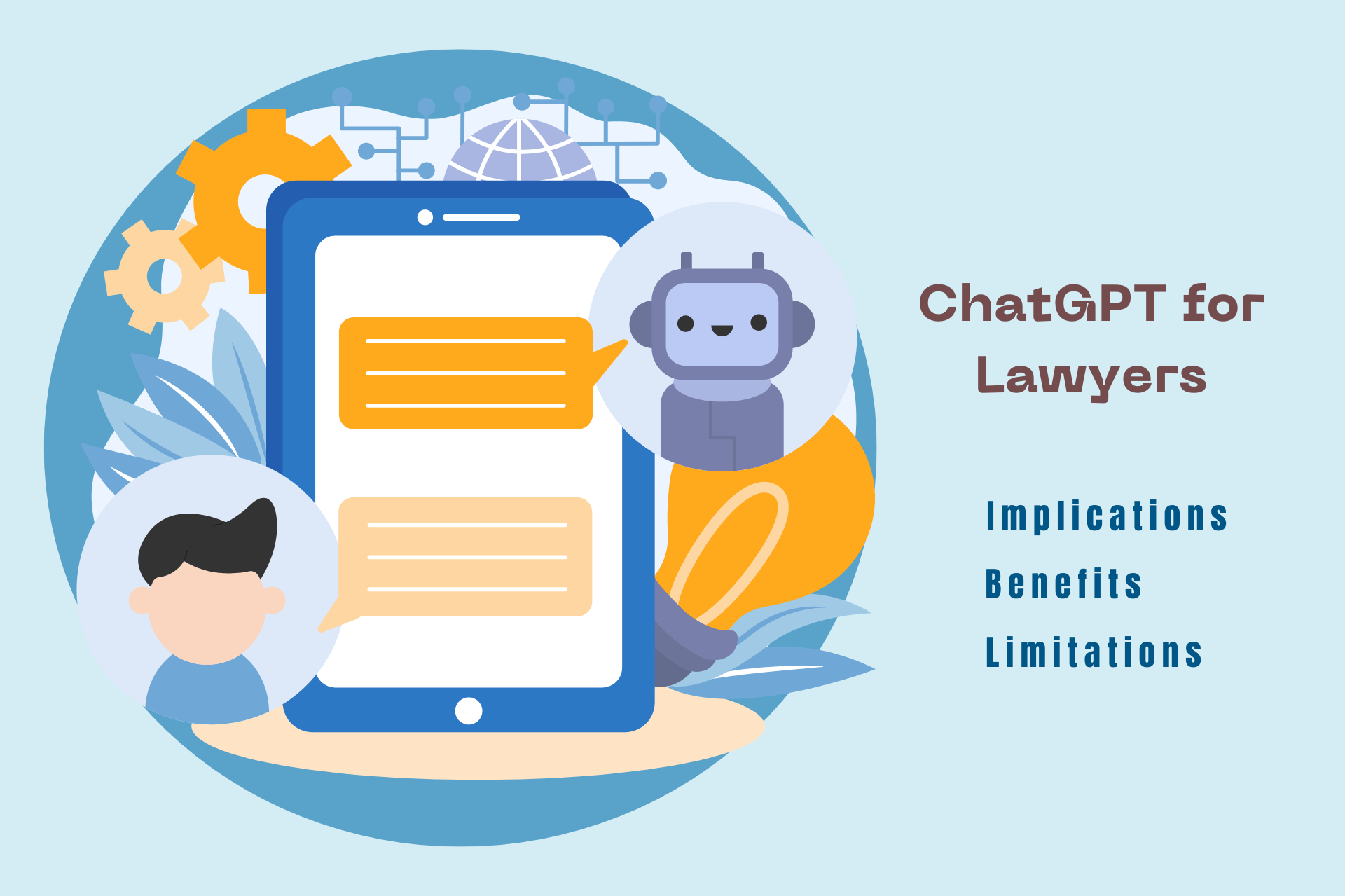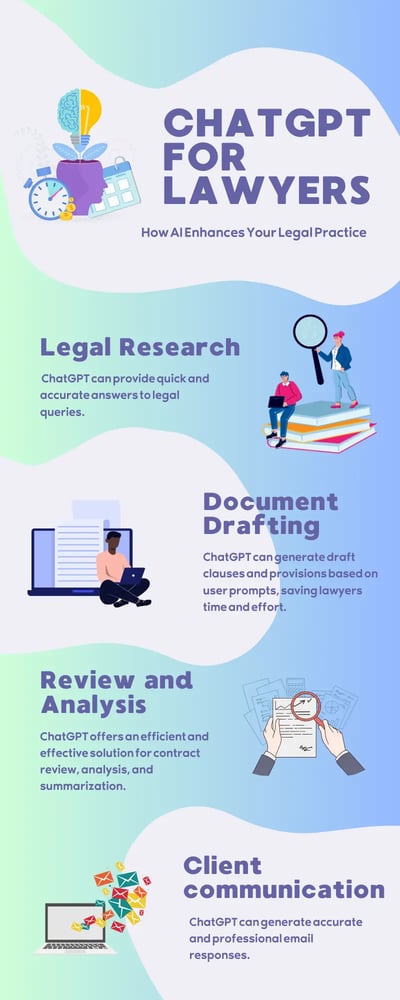
ChatGPT For Lawyers: Is It The Future Of Legal Work?
Content
- What is ChatGPT?
- How does ChatGPT impact legal work?
- Legal research
- Document drafting
- Review, analysis, and summarization
- Client communication
- What are the benefits of ChatGPT for lawyers?
- What are the limitations of ChatGPT for lawyers?
- Conclusion
Artificial intelligence had everyone talking in 2023, from Google to Tom Cruise. Whether you have a finger on the pulse or not, you couldn’t have missed the advent of ChatGPT and the whole world reacting to it. It sparked curiosity, worries, and panic about whether it would replace us in our jobs.
The legal profession couldn’t escape it either. With the latest version of ChatGPT passing the Uniform Bar Examination and concerns about AI replacing lawyers, a lot was going on. So, for once and all, we’ll clear up all your doubts about using ChatGPT for legal work. While it has challenges, AI is a technology the legal world can’t ignore for a productive outcome.
What is ChatGPT?
ChatGPT, an advanced language model by OpenAI, produces human-like responses in a conversational setting. It uses deep learning techniques to understand and generate text based on the input. It sources data from the internet to create coherent and contextually appropriate responses. From virtual assistants to customer support chatbots to language translation tools, it’s valuable for enhancing user experiences in various domains.
So, if you give a prompt or ask a question, ChatGPT gives a human-like response. From website codes to business plans, there’s a lot you could do with AI. Users can create content for professional and personal purposes with a simple prompt. Legal practitioners can use it for several reasons to make their work easier.
How does ChatGPT impact legal work?
Technology can go a long way in assisting humans with menial and time-consuming tasks. It can streamline legal processes and improve the overall efficiency of legal work. While ChatGPT cannot replace the expertise of a human lawyer, it can improve the quality and accuracy of legal work. Here’s how:

Legal research
Traditionally, legal research involves sifting through numerous legal documents, cases, statutes, and journals to find relevant information. This process can be time-consuming and tedious, often requiring the expertise of legal professionals. However, ChatGPT can simplify and streamline this process by providing quick and accurate answers to legal queries. Legal researchers can simply input their queries in natural language and receive instant responses. The model understands complex legal concepts and can provide relevant information from its vast database.
For instance, a researcher can ask ChatGPT about the legal prerequisites for creating a contract in a particular jurisdiction, and the system will provide them with a thorough response based on relevant laws and precedents.
Legal professionals can save significant time and effort in their research endeavors. Instead of manually searching through countless legal documents, they can rely on the model to provide accurate and up-to-date information. This efficiency boost allows legal researchers to focus on analyzing and strategizing rather than research.
Document drafting
Drafting legal documents involves several tasks. Firstly, it requires a thorough understanding of the relevant laws and regulations about the subject matter. It ensures that the document is accurate and compliant with the legal framework. Secondly, it involves careful research and analysis to gather all the necessary information and facts. It includes reviewing case law, statutes, and other legal sources. Thirdly, it requires strong writing skills to communicate complex legal concepts clearly and concisely.
ChatGPT can significantly speed up the contract drafting process. It can generate draft clauses and provisions based on user prompts, saving lawyers time and effort. ChatGPT can analyze legal language and context to ensure its accuracy. It can catch inconsistencies, suggest revisions, and reduce the risk of errors.
Review, analysis, and summarization
ChatGPT’s natural language processing capabilities enable it to process and understand the contents of a contract. Businesses can easily extract critical information and identify key terms and clauses. It can save time and effort for legal professionals, allowing them to focus on higher-level analysis and decision-making.
Additionally, ChatGPT can provide a concise summary of the contract, highlighting the main points and potential risks or concerns. It can help users quickly grasp the key aspects of the contract without having to read through the entire document. Overall, ChatGPT offers an efficient and effective solution for contract review and analysis, enhancing productivity and accuracy in the legal field.
Client communication
Lawyers can leverage ChatGPT for client communication in several ways. Firstly, the natural language processing capabilities of ChatGPT can help lawyers draft clear and concise emails that effectively communicate legal information to clients. Additionally, ChatGPT can assist lawyers in providing quick responses to clients' inquiries, saving them time and improving client satisfaction.
Moreover, ChatGPT can be trained on specific legal knowledge and terminology to generate accurate and professional email responses. Overall, incorporating ChatGPT into their workflow can enhance lawyers' communication with clients and streamline their email correspondence.
What are the benefits of ChatGPT for lawyers?
As discussed, legal professionals should use ChatGPT as a supplementary resource to enhance their work and provide better services. From legal research to drafting documents, AI contract management has the potential to revolutionize the way lawyers operate. Here are some of the benefits:
Time and cost savings
ChatGPT offers several benefits for lawyers, one of which is time and cost savings. By using AI, legal professionals can automate tasks and streamline their workflow. It allows them to spend less time on mundane or repetitive tasks, such as drafting legal documents or conducting initial client intake interviews. By automating these tasks, lawyers can focus their time and energy on more complex and high-value activities, such as case analysis and client counseling. Additionally, using ChatGPT can reduce the need for hiring additional staff and save on recruitment and training costs.
Improved client satisfaction
ChatGPT can provide accurate responses to client queries, addressing their concerns promptly. It helps to enhance the overall client experience and satisfaction, as they feel heard and supported by their legal representative. With the ability to generate detailed and knowledgeable responses, ChatGPT can also provide clients with valuable information and guidance, further increasing their satisfaction with legal services. By leveraging ChatGPT, lawyers can improve client relationships and ultimately build a positive reputation in the legal industry.
Scalability and availability
Artificial intelligence offers several benefits for organizations looking to scale their business operations. With its ability to handle a large volume of inquiries simultaneously, ChatGPT allows lawyers to address multiple client queries at once. This scalability is particularly useful for law firms that receive a high volume of inquiries or have limited staff resources. Additionally, the availability of ChatGPT ensures that clients can receive prompt assistance, even outside of regular business hours. This 24/7 accessibility enhances client satisfaction and allows lawyers to provide timely client support.
What are the limitations of ChatGPT for lawyers?
Following the law and ethical guidelines is a professional obligation for attorneys. They must ensure that using AI chatbots like ChatGPT does not violate any rules, including conflicts of interest, unauthorized practice of law, or misleading representation. The use of ChatGPT raises concerns about maintaining client confidentiality. Lawyers must ensure that sensitive information shared with the AI chatbot is secure and protected from unauthorized access. Legal professionals should be cautious about the data privacy and ownership implications of using AI chatbots.
ChatGPT can provide valuable information, but legal professionals must do their due diligence. It is important to remember that ChatGPT generates responses based on patterns and examples it has been trained on rather than having real-time access to factual information. While it can provide general legal knowledge, it may not always be up-to-date with current laws and regulations. For example, a lawyer in New York was disciplined for referring to an AI-generated fictitious case. Hence, legal professionals should use ChatGPT as a starting point for research and verification rather than relying solely on its responses.
Conclusion
Implementing ChatGPT in legal practice requires careful consideration of ethical and accuracy concerns. It still calls for the expertise and sensibility of lawyers. The best way to achieve this is by integrating artificial intelligence with the existing legal systems.
Dock 365 contract management software does just that with its seamless collaboration with OpenAI. It enables its users to make the most of AI and ChatGPT within the contract management process. They can extract clauses, summarize contracts, and generate templates to streamline the contract lifecycle. Users can ask questions, seek clarifications, or get guidance on contract-related matters from ChatGPT with Dock, ensuring a smooth and intuitive experience. The legal professionals can oversee the data and insights to maintain accuracy and compliance.
Book a Live demo
Schedule a live demo of Dock 365's Contract Management Software instantly.
.png?width=196&height=196&name=MicrosoftTeams-image%20(24).png)
Written by Deepti Gopimohan




